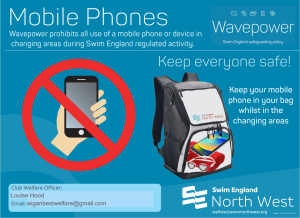WIGAN BEST WELFARE OFFICER
Mrs Louise Hood
Contact: wiganbestwelfare@gmail.com
CHILD WELFARE POLICY
Wigan BEST Swimming Club complies with Wavepower (published 3rd January 2024), Swim England Safeguarding Policy.
In line with Wavepower, Wigan Best is committed to making our sport and our club activities accessible, inclusive and safe for people of all ages and backgrounds. Wigan Best recognises and strives to safeguard both children and adults in line with current legislation, regulations and guidance.
The Children’s Act, 2004, places duties on a range of organisations and individuals to ensure their function and any others they contract out to others are discharged having regard to the need to safeguard and promote the welfare of children. Wigan Best has a duty of care to our members. Our paid and volunteer teams have a duty to be aware of their responsibilities for safeguarding and promoting the welfare of children, how they should respond to child protection concerns and make appropriate referrals as necessary.
Swim England’s Wavepower document can be viewed here:
In order to meet our safeguarding requirement and in line with both Wavepower and Wigan Best codes of conduct will:
- Follow the policies and procedures in Wavepower in full and use it as required.
- Promote and raise awareness of Wavepower to all of our members.
- Ensure that all Wigan Best members are aware of their responsibilities and the procedures to be followed in the event of any concerns about a child or adult’s safety or welfare.
- Promote a culture of listening to children and adults at risk.
All staff and volunteers involved with Wigan BEST Swimming Club are required to adopt best practice to safeguard and protect children from abuse and to minimise risk to themselves, this includes undertaking training relevant to their role within the club and required recruitment and DBS (Disclosure and Baring Service) checks as relevant.
If you have Concerns about the Welfare of a Child
Remember, it is not your responsibility to decide whether a child is being abused or not, but do act if you are concerned. Make a detailed note of what you have seen or heard and do not delay in passing on the information.
If you are a member, or the parent/carer or friend of a member of Wigan BEST Swimming Club, you should:
- Tell the Club Welfare Officer, Chairman, Club Secretary or Coach (unless you suspect them of being involved)
- Contact the Regional (Swim England North West) welfare officer welfare@swimenglandnorthwest.org or the County (Swim Lancashire) welfare officer welfare@swimlancashire.org.uk
- If you have a concern that a child or adult is in immediate danger ring 999.
MOBILE TELEPHONE POLICY
Wigan BEST are fully committed to supporting safeguarding in changing rooms and support the Swim England position that all use of mobile telephones or devices are prohibited during all Wigan BEST and Swim England regulated activity.
We will record and report concerns to Swim England if there is a concern that an image or a video has potentially been captured.
ADDITIONAL CONTACTS AND RESOURCES
Swim England
- 01509 640700 (Option 1 for Swim England and then Option 3 for Safeguarding)
- Calls are free of charge
Childline
- 0800 1111
- http://Childline.org.uk
- Calls are free of charge
NSPCC – Child Protection in Sport Unit
Ann Craft Trust: Safeguarding Adults at Risk
CEOP – Child Exploitation and Online Protection
UK Safer Internet Centre: Professionals Online Safety Helpline
Anti-Bullying Alliance
Mind: The Mental Health Charity
Sport England Club Matters
Working together to safeguard children
Information sharing advice for practitioners providing safeguarding services to children, young people, parents and carers:

